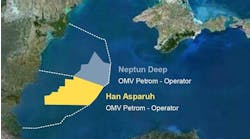Editor's note: This Beyond the Horizon column first appeared in the March-April issue of Offshore magazine. Click here to view the full issue.
By Alex Epstein, Founder, Center for Industrial Progress
The false idea that fossil fuels’ climate impacts are an “emergency” that requires us to rapidly eliminate fossil fuels has caused an actual energy emergency. The “climate emergency” movement must be held accountable.The world is experiencing the worst energy crisis since the 1970s, and it may end up being far worse. Skyrocketing energy prices are driving price inflation in every area of life. Even in wealthy Europe we have seen mass hardship, deindustrialization, and fear of winter.
While America is suffering from the energy crisis and Europe is suffering far more, the worst-affected are poor nations—who are getting outbid for today’s scarce energy supplies. For example, we’ve seen power outages in Bangladesh, which has been outbid for natural gas by Europe.
The global energy crisis constitutes an emergency—a dire and deadly problem requiring a swift, dramatic solution.
What’s the solution to the global energy emergency? We must put a stop to its cause: the “climate emergency” movement’s campaign to rapidly eliminate fossil fuels.
While “climate change”—humans impacting climate—is real, “climate emergency” is not. The world is slowly becoming warmer—at a cold point in geological history, when many more people die of cold than of heat. This doesn’t at all justify rapidly restricting global fossil fuel use.
The truth is that fossil fuels’ CO2 emissions have contributed to the warming of the last 170 years, but that warming has been mild—1°C, mostly in the colder parts of the world. And life on Earth thrived (and was far greener) when CO2 levels were at least five times higher than today’s.
Fossil fuels actually overall make us far safer from climate by providing low-cost energy for the amazing machines that protect us against storms, protect us against extreme temperatures, and alleviate drought. Climate disaster deaths have decreased 98% over the last century.
Even the UN Intergovernmental Panel on Climate Change (IPCC), which has a history of catastrophizing fossil fuels’ climate impacts and ignoring their climate benefits, contemplates no scenario in which overall well-being declines due to climate change.
The only rational approach to reducing fossil fuels’ CO2 emissions is a long-term one based on liberating low-carbon innovation.
That will lead to the development of truly globally cost-competitive alternatives—most promisingly, low-cost, global-scale nuclear energy.
Unfortunately, instead of recognizing that CO2 emissions are not an emergency and pursuing a long-term emissions-reduction policy of liberating low-carbon alternatives, our leaders declared “emergency” and started immediately restricting fossil fuels—with no viable replacement.
The “climate emergency” movement, centered in the West, has restricted: 1) fossil fuel investment 2) fossil fuel production 3) fossil fuel transport.
This has artificially suppressed fossil fuel supply, making industry unable to meet growing demand. Which means sky-high prices.
For fossil fuel energy to remain low-cost requires sufficient investment. But the “climate emergency” movement has used government and private entities, often under the banner of “ESG,” to punish and suppress it—meaning less fossil fuel supply.
Is it any wonder that, threatened with punishment, investment in oil and gas declined dramatically? Between 2011 and 2021, oil and gas exploration investments declined by 50%. Less investment equals less supply equals higher prices.
For fossil fuel energy to remain low-cost for billions of people requires that producers be free to produce it all around the world.
The “climate emergency” movement has opposed it throughout the world, often successfully, increasing prices.
The “climate emergency” movement pushed France, Germany, the UK, Bulgaria, Spain, Ireland, Denmark, and The Netherlands to place preemptive bans on fracking—the source of bounteous oil and gas production in the United States.
For fossil fuels to remain low-cost for billions of people we need to be able to easily transport them from where they are produced to where they are used. But the “climate emergency” movement has opposed transportation around the world.
In the US, opposition to natural gas pipelines and LNG terminals has prevented us from offering cheap gas throughout the country and around the world. In Canada, home of staggering oil deposits, pipeline restrictions have limited their ability to bring oil to market.
The “climate emergency” movement has rationalized its opposition to fossil fuel investment, production, and transport with claims that solar and wind could rapidly replace fossil fuels.
This has obviously not happened. Despite huge solar and wind subsidies, fossil fuel demand has increased.
There was never any reason to expect solar and wind to replace fossil fuels. The world needs far more energy—three billion people still use less electricity than a single US refrigerator—so there’s no reason to expect lower demand for any form of cost-effective energy, let alone ultra-versatile fossil fuels.
Solar and wind’s basic problem is unreliability, to the point they can go near zero at any time. Thus they don’t replace reliable power, they parasite on it. This is why they need huge subsidies and why no grid is near 50% solar or wind without huge parasitism on reliable neighbors.
The “climate emergency” movement successfully perpetrated two deceptions on the world. One was that we needed immediate, drastic action against fossil fuels. The second was that unreliable solar and wind would save us from adverse consequences. The cost of these deceptions has been a global energy emergency.
The solution to the global energy emergency is to reject the “climate emergency” movement and embrace the freedom to use all forms of energy.



